MercoPress. South Atlantic News Agency
Tag: María Eugenia Vidal
-
Friday, August 11th 2017 - 08:32 UTC
Argentina Sunday's primary election: a re-edition of the Cristina Fernandez/Macri dispute
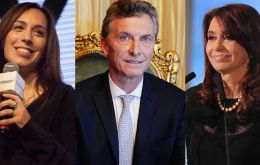
On Sunday Argentines will be able to choose their candidates to the Senate and Lower House for the midterm October elections, in a process known as PASO, which means open mandatory, simultaneous primaries for all parties, but which are not compulsory for the electoral roll.
-
Tuesday, July 4th 2017 - 02:34 UTC
Buenos Aires-Mar del Plata train runs again
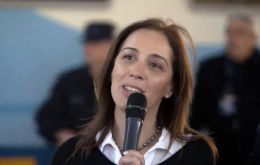
After two years out of service, Buenos Aires and Mar del Plata, which are 400 kilometres apart, are since Monday again linked by a train service that needs almost seven hours to reach its final destination. Buenos Aires provincial Governor María Eugenia Vidal said “It is no longer a promise - we have delivered.”
-
Tuesday, November 8th 2016 - 06:48 UTC
BA Governor Vidal, World Bank agree to finance Salado River works

María Eugenia Vidal, governor of the province of Buenos Aires, reached an agreement with the World Bank for a 380-million-dollars loan to finance infrastructure works that would be beneficial to more than sixty municipalities. Bidding to start in March.
-
Tuesday, August 16th 2016 - 07:03 UTC
Macri will move in an armored car following an attack with stones
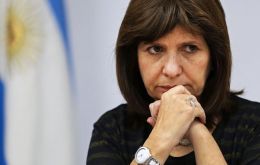
Argentine president Mauricio Macri will be moving in an armored sealed following this month's attack with stones during a rally in the city of Mar del Plata. The measure was announced by Security minister Patricia Bullrich who claimed political activists close to former president Cristina Fernandez of having organized the attack.
-
Monday, July 4th 2016 - 09:20 UTC
Pope Francis at peace with Macri: denies any problems, “he's a noble person”
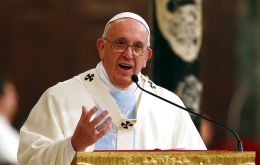
Pope Francis said he has no problems with Argentine president Mauricio Macri, whom he described as a well born, noble person, revealing that in the past, as mayor and archbishop of Buenos Aires, they had differences but always addressed them in private and positively.
-
Monday, June 6th 2016 - 11:01 UTC
Support for Macri remains strong despite tough economic measures

A majority of Argentines continue to support president Mauricio Macri despite a raft of unpopular measures, public utilities rate increases, inflation, redundancies and slower activity, which his administration has been forced to implement in the first six months of his mandate in an attempt to reorganize the country's economy.
-
Wednesday, November 25th 2015 - 08:09 UTC
An Anti-incumbency Vote Whose Effects Will be Seen Beyond Argentina
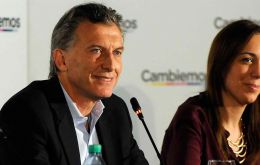
By Rengaraj Viswanathan (*) Mauricio Macri’s win will inspire the centre-right opposition parties that hope to replace leftist governments in Brazil and Venezuela but it is too early to declare, as some observers are doing, that the result marks the end of the Left in the region
-
Monday, November 2nd 2015 - 09:51 UTC
Cracks in the incumbent strategy to win Argentina's presidential runoff
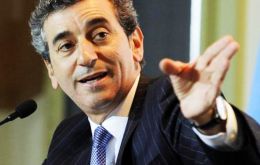
Following claims of 'friendly fire', cracks are clearly surfacing in the Argentine ruling coalition strategy to conquer lost ground in the 25 October presidential vote which has forced a runoff on 22 November. Daniel Scioli was expected to beat his runner up by almost ten votes, but this did not happen, in effect Mauricio Macri was defeated by a mere 2.5 percentage points and his PRO party won the governorship of the strategic Buenos Aires province, Argentina's main electoral district.
-
Friday, October 30th 2015 - 07:15 UTC
Cristina Fernandez calls at emotional rally to defend her progressive policies
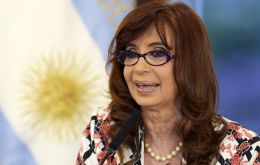
Argentina's outgoing leader Cristina Fernandez gave an emotional campaign speech on Thursday in her first public address since a surprisingly weak performance by her handpicked candidate in the first-round presidential election on Sunday. Without mentioning allied candidate Daniel Scioli by name, the outgoing president implicitly backed him by calling for support for her progressive social policies to go on after she hands the presidency over to her successor in six weeks.
-
Thursday, October 29th 2015 - 07:18 UTC
Macri ahead of Scioli, with 8.8% still undecided shows first poll following Sunday's vote
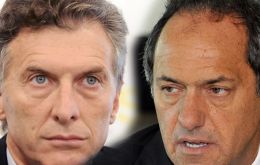
The first public opinion poll released since Argentina's Sunday presidential election and ahead of the 22 November runoff indicates that the opposition candidate Mauricio Macri is a few points ahead of incumbent Daniel Scioli in a tight race but still with a large percentage who remain undecided.
